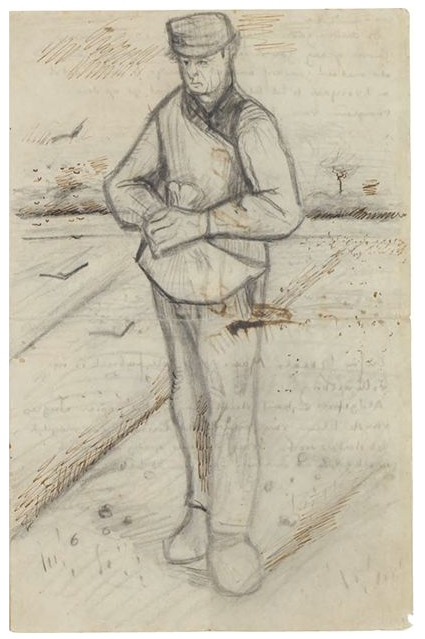
In a letter to his brother Theo, dated Thursday, 3 November 1881, found in Ever Yours: The Essential Letters, Vincent van Gogh describes an unreciprocated love and in so doing alludes to three stages of love.
My dear Theo,
There’s something on my mind that I want to tell you. Perhaps you already know something about it, and what I’m telling you isn’t news.
I wanted to tell you that this summer I’ve come to love Kee Vos so much that I could find no other words for it than ‘it’s just as if Kee Vos were the closest person to me and I the closest person to Kee Vos’. And — I said these words to her. But when I told her this, she replied that her past and her future were all one to her and so she could never return my feelings.
Then I was in an awful dilemma about what to do, to resign myself to that no, nay, never, or — not yet to regard the matter as over and done with, and to take courage and not give up yet.
I chose the latter. And until now I haven’t regretted that decision, even though I’m still confronted with that no, nay, never.
Since then, of course, I’ve suffered a great many ‘petty miseries of human life’, which, if they were written down in a book, could perhaps serve to amuse some people, though they can hardly be considered pleasant if one experiences them oneself. Nonetheless, up to now I’ve been glad that I left the resignation or ‘how-not-to-do-it’ method to those who prefer it and, as for myself, plucked up a little courage. You understand that in cases like this it’s surprisingly difficult to know what one can, may and must do. But ‘wandering we find our way’, and not by sitting still.
One of the reasons I haven’t written to you about it before now is that the position in which I found myself was so vague and undecided that I couldn’t explain it to you.
[…]
I said that now the situation is becoming somewhat clearer. First, Kee says no, nay, never, and furthermore I believe that I’ll have tremendous difficulty with the elders who already regard the matter as over and done with and will try and force me to give up. For the time being, though, I believe they’ll proceed with caution, keeping me dangling and fobbing me off until Uncle and Aunt Stricker’s big celebration (in December) is over. Because they want to avoid scandal. After that, though, I fear that steps will be taken to get rid of me.
Forgive the rather harsh terms I’m using to make my position clear to you. I admit that the colours are a little harsh and the lines drawn a bit too hard, but it will nevertheless give you a clearer picture of the situation than if I were to beat about the bush. So don’t suspect me of lack of respect for those Elder persons.
[…]
Yet by now you understand that I mean to leave no stone unturned in my endeavours to bring me closer to her, and I declare that
I shall love her so long
That in the end she’ll love me too.The more she disappears, the more she appears.
Theo, aren’t you in love too, at times? I wish you were, for believe me, the ‘petty miseries’ of it are also of some value. Sometimes one is desolate, there are moments when one is in hell, as it were, but — it also brings with it other and better things. There are three stages, first not loving and not being loved, second loving and not being loved (the case in question), third loving and being loved.
I’d say that the second stage is better than the first, but the third! That’s it.
Now, old boy, go and fall in love and tell me about it sometime. Keep quiet about the case in question and sympathize with me.
He followed that up in another letter to Theo from May 1, 1882.
Last year I wrote you a great many letters telling you what I thought about love. I’m not doing so now, because I’m busy putting those same things into practice. The person for whom I felt what I wrote to you is not on my path, is beyond my reach, despite all my longing for her. Would I have done better to go on thinking of her and to overlook what came my way? I cannot decide whether I’m acting consistently or inconsistently. Suppose I were to start today on a drawing of a digger, for example — but the man says, I have to leave and won’t or can’t pose again — I don’t have the right to blame him for leaving me there with a barely sketched drawing, the more so because I started to draw him without asking permission. Must I then give up drawing a digger? I think not, especially not if tomorrow I encounter one who says, I want to come not only today but also tomorrow and the day after, and I understand what you need, go ahead, I’m patient and have the good will to do it. To be sure, I didn’t stick exactly to my first impression, but would I have done better to reason: no, I definitely need that first digger, even if he says, I can’t and won’t? And once I’ve started on No. 2, then I may certainly not work without reference to the nature standing before me, thinking the while of No. 1. That’s how things stand.
